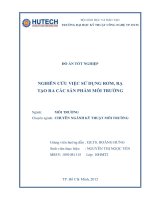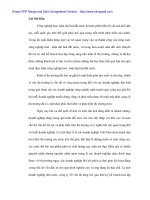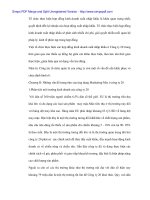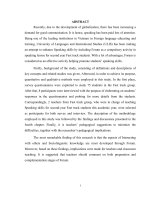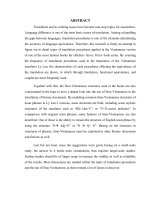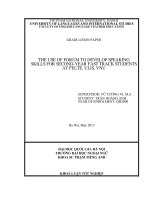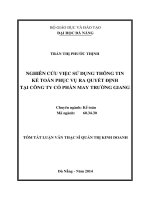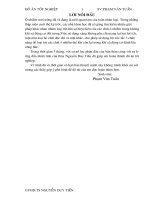Nghiên cứu việc sử dụng các hoạt động nhóm để nâng cao kỹ năng nói cho các thành viên của Câu lạc bộ Tiếng Anh ở trường PT Vùng Cao Việt Bắc
Bạn đang xem bản rút gọn của tài liệu. Xem và tải ngay bản đầy đủ của tài liệu tại đây (434.53 KB, 52 trang )
VIETNAM NATIONAL UNIVERSITY, HANOI
UNIVERSITY OF LANGUAGES AND INTERNATIONAL STUDIES
FACULTY OF POST-GRADUATE STUDIES
…………..o0o…………
PHÙNG THỊ THU HẰNG
A STUDY ON USING GROUPWORK ACTIVITES TO IMPROVE
SPEAKING SKILL FOR THE MEMBERS OF AN ENGLISH CLUB
AT VUNG CAO VIET BAC HIGH SCHOOL
Nghiên cứu việc sử dụng các hoạt động nhóm để nâng cao kỹ năng nói cho các
thành viên của Câu lạc bộ Tiếng Anh ở trường PT Vùng Cao Việt Bắc
MA. MINOR PROGRAMME THESIS
FIELD: ENGLISH TEACHING METHODOLOGY
CODE: 60140111
HANOI – 2014
VIETNAM NATIONAL UNIVERSITY, HANOI
UNIVERSITY OF LANGUAGES AND INTERNATIONAL STUDIES
FACULTY OF POST-GRADUATE STUDIES
…………..o0o…………
PHÙNG THỊ THU HẰNG
A STUDY ON USING GROUPWORK ACTIVITES TO IMPROVE
SPEAKING SKILL FOR THE MEMBERS OF AN ENGLISH CLUB
AT VUNG CAO VIET BAC HIGH SCHOOL
Nghiên cứu việc sử dụng các hoạt động nhóm để nâng cao kỹ năng nói cho các
thành viên của Câu lạc bộ Tiếng Anh ở trường PT Vùng Cao Việt Bắc
MA. MINOR PROGRAMME THESIS
FIELD: ENGLISH TEACHING METHODOLOGY
CODE: 60140111
SUPERVISOR: HOÀNG THỊ XUÂN HOA, PhD
HANOI – 2014
i
DECLARATION
I certify that this thesis is the result of my own research and the substance of this
thesis has not been submitted for a degree to any other university or institution.
Phùng Thị Thu Hằng
ii
ACKNOWLEDGEMENTS
First of all, I wish to express my deepest gratitude to my supervisor – Ms Hoàng Thị
Xuân Hoa for her constant encouragement, precious advice and especially for her valuable
corrections throughout this study. There is no doubt that without her help, this thesis would
be impossible to be accomplished.
My sincere thanks are also sent to the lecturers of the Faculty of Post Graduate
Studies of University of Languages and International Studies for their useful lessons and
whole-hearted advices.
I would like to acknowledge my thanks to all the authors of the books, magazines,
and other materials listed in the reference part for their ideas that have been reflected and
developed in the study.
I am indebted to my family and friends who have encouraged and supported me very
much in the completion of this paper. If there had not been great help from the above
people, the study could not have been fulfilled.
Last but not least, I would like to thank the students who willingly took part in the
survey of this paper.
iii
ABSTRACT
This research generally attempts to investigate using groupwork activities to
improve speaking skill for students in the English club at Vung Cao Viet Bac High School
(VCVBHS).
The study has been conducted for the purpose of clarifying how groupwork are
used in speaking lessons of the students in the English club at VCVBHS and investigating
the difficulties of using groupwork activities in teaching and learning speaking skill for
students of the English club at VCVBHS. The data were obtained through the analysis of
students’ questionnaire, interviews with four English teachers who are controlling directly
the English club. The findings of the research revealed that groupwork activities were
frequently used to improve the speaking skill. The use of groupwork activities were also
beneficial for both teachers and learners. However, the study also found out some students’
difficulties such as low proficiency, their passive way of learning styles, using Vietnamese
when working in groups…, and some teachers’ difficulties in using groupwork activities in
such as lack of time, large and multi-level classes,…The author also gave some
recommendations to make groupwork activities effective and successful in speaking
lessons and to help students in the English club at Vung Cao Viet Bac High School to
improve their speaking skill.
It is hoped that this thesis will help other English teachers be aware of the benefits
of groupwork activities and apply them in teaching English speaking more successfully
and effectively.
iv
LIST OF ABBREVIATIONS
VCVBHS: Vung Cao Viet Bac High School
ESL
: English as a Second Language
v
LIST OF TABLES
TABLES
Table 1:
Students’ opinions on learning English speaking skill
Table 2: The teachers’ frequent use of groupwork activities
Table 3: The students and teachers' opinions on benefits of groupwork activities
Table 4:
Organization of groupwork activities in speaking activity
Table 5: Kinds of groupwork activities that students want to participate in
Table 6:
The difficulties students had when working in group work
Table 7: The students' suggestions to make group work activities in speaking lesson
effective
vi
TABLE OF CONTENTS
DECLARATION .................................................................................................................... i
ACKNOWLEDGEMENTS ...................................................................................................ii
ABSTRACT..........................................................................................................................iii
TABLE OF CONTENTS...................................................................................................... iv
LIST OF ABBREVIATIONS ............................................................................................... iv
PART A: INTRODUCTION ................................................................................................. 1
1. Rationales of the study .................................................................................................. 1
2. Aims of the study .......................................................................................................... 2
3. Significance of the study ............................................................................................... 2
4. Research questions ........................................................................................................ 3
5. Scope of the study ......................................................................................................... 3
6. Methods of the study ..................................................................................................... 3
7. Design of the study. ...................................................................................................... 4
PART B: DEVELOPMENT .................................................................................................. 5
CHAPTER 1: LITERATURE REVIEW ............................................................................... 5
1.1. Speaking skill ............................................................................................................ 5
1.1.1. Nature of speaking skill ................................................................................... 5
1.1.2. Concepts of speaking (spoken language)......................................................... 5
1.1.3. Characteristics of speaking .............................................................................. 6
1.2.4. The importance of speaking skill in language teaching and learning context . 7
1.2. Group work in a speaking lesson ............................................................................... 8
1.2.1. Definitions of group work................................................................................ 8
1.2.2. How to organize group work activities effectively .......................................... 9
1.2.2.1. Forming students in groups....................................................................... 9
1.2.2.2. Preparing for students to work in group ................................................. 10
1.2.2.3. Monitoring groupwork activities ............................................................ 10
1.2.2.4. Ending groupwork activities ................................................................... 10
1.2.3. Benefits of using groupwork activities in language teaching ........................ 11
1.2.4. The role of the teacher and the role of each student in groupwork activities 12
1.2.4.1. The role of the teacher ............................................................................ 12
1.3.4.2. The role of each student in groupwork activities .................................... 13
vii
1.3. Summary .................................................................................................................. 14
CHAPTER 2: RESEARCH METHODOLOGY ................................................................ 15
2.1. An overview of the English club at VCVBHS ........................................................ 15
2.2. The subjects of the study .......................................................................................... 16
2.2.1. Student subjects ............................................................................................. 16
2.2.2. Teacher subjects ............................................................................................. 16
2.3. Research questions ................................................................................................... 17
2.4. Data collection instruments ...................................................................................... 17
2.4.1. Questionnaire ................................................................................................. 17
2.4.2. Semi-structured interview .............................................................................. 18
2.5. Summary .................................................................................................................. 18
CHAPTER 3: DATA ANALYSIS ...................................................................................... 19
3.1. The students’ and teachers’ opinions on learning and teaching English speaking
skill .................................................................................................................................. 19
3.2. The students and teachers' opinions on the benefits of groupwork activities .......... 20
3.3. The students’ and teachers’ organization of groupwork activities in speaking
activity ............................................................................................................................. 23
3.4. Difficulties the teachers and students have faced when using groupwork activities26
3.5. The teachers’ solutions to overcome their difficulties ............................................. 27
3.6. The students' suggestions to make groupwork activities in speaking lessons
effective ........................................................................................................................... 28
3.7. The teachers' suggestions to help students use groupwork activities in speaking
lesson effectively............................................................................................................. 29
3.8. Summary .................................................................................................................. 29
CHAPTER 4. FINDINGS AND RECOMMENDATIONS ............................................... 30
4.1. Research question 1: How groupwork activities are used in the speaking lessons of
the students in the English club at VCVB high school? ................................................. 30
4.2. Research question 2: What are the difficulties the teachers and the students in the
English club at VCVBHS face when using groupwork activities? ................................. 31
4.2.1. Students’ difficulties ...................................................................................... 31
4.2.2. Teachers’ difficulties ..................................................................................... 32
viii
4.3. Some recommendations to make groupwork activities effective and successful in
speaking lessons and to help students to improve speaking skill. .................................. 33
4.4. Summary .................................................................................................................. 34
PART C: CONCLUSION .................................................................................................... 35
1. Conclusions ................................................................................................................. 35
2. Limitations of the study .............................................................................................. 36
3. Suggestions for further research.................................................................................. 37
REFERENCES .................................................................................................................... 38
APPENDICES ........................................................................................................................I
APPENDIX 1 ..........................................................................................................................I
Survey questionnaire for students ...........................................................................................I
APPENDIX 2 .......................................................................................................................IV
INTERVIEW QUESTIONS FOR TEACHERS..................................................................IV
1
PART A: INTRODUCTION
1. Rationales of the study
English has become one of the most important languages and powerful languages
in the world. In Vietnam, Ministry of Education and Training has put more emphasis on
teaching and learning foreign languages, especially English than ever before. In recent
years, English has been considered one of some important subjects and a compulsory one
for Vietnamese students. "Better English, better careers" was the answer given by many of
them when they told about their purpose of learning this language. It can not be denied that
this international language may help Vietnamese students prepare better for their career in
the future because it does not only equip learners with a necessary source of information of
social and culture knowledge but also gives them up-to-date information concerning a
different issues in our society nowadays. Especially, our country's recent regional and
global participation has been increasing the demand for English speaking people, who are
wanted to communicate with the outside world and access up-to-date technology.
In response, the teaching and learning English has been paid much attention to,
which is shown by remarkable changes in curriculum, studies accompanied as well as
teaching methods which are all applied for the four English skills. As a matter of fact,
speaking skill “the most important aspect of learning a second language” (Nunan, 1989) is
still a challenge for Vietnamese learners who still show a low motivation in speaking
English. Therefore, together with this trend, speaking skills have also become the focus of
language teaching as far as the objectives of English course at schools and universities are
concerned. As their major subject is English, each of the students at English club, Vung
Cao Viet Bac High School is always aware of how important speaking skill to them.
However, most students at Vung Cao Viet Bac high school are from different mountainous
areas in the northern of Vietnam. Maybe they were good at grammar but they have a lot of
difficulties in speaking English. They feel shy when they speak and they do not have a lot
of chances to practice English in communication or for interaction in their daily life that is
why speaking this language has not had the best result. Therefore, it is necessary to help
the students of English club at Vung Cao Viet Bac high school to have more chances to
communicate with each other as well as to speak to each other in a so-called close-to-real
English speaking condition. One of the strategies that reflects the principle of learner -
2
centeredness is groupwork activity. According to Nunan and Lamb (1996 : 142) group
work is designed as any classroom activity in which learners perform collaborative tasks
with one or more speakers. It has been considered one of the main changes to the dynamics
of classroom interaction wrought by students-centered teaching. They hope that by using
this teaching method, they can help their learners improve their English and use it
effectively and fluently in communication.
The effort of this thesis is trying to determine effective methods in teaching
speaking skill for learners and to help students to improve speaking skills. Having students
work in groups not only makes them more involved in learning but also give them
opportunities to practice foreign language. There are many reasons for choosing the study
but the above reasons are the main ones that encourage the researcher to choose the thesis:
“A study on using groupwork activities to improve speaking skill for the members of an
English club at Vung Cao Viet Bac high school”
2. Aims of the study
This study is aimed at investigating the reality of the use of groupwork activities in
speaking activities of the members in the English club at VCVBHS. To be specific, the
aims of the study are:
+ To clarify how groupwork activities are used in speaking lessons of the students in
the English club at VCVBHS.
+ To investigate the difficulties of using groupwork activities to improve speaking
skill for students of the English club at VCVBHS.
3. Significance of the study
This study helps to determine how groupwork activities are used to improve
English speaking skill. It provides language teachers with the rationale to carry out
groupwork activities in class to improve students’ speaking skills. This study also gives
suggestion to ESL teachers to develop successful groupwork activities as they can identify
the major problems faced by themselves and by their students. Thus, teachers are
conscious with the advantages of group work in teaching and learning process.
In addition, the students will appreciate and work with the strengths of others. This will
increase learning, planning and discussion skills and eventually improve their speaking
capabilities. The students will be involved as participants and decision-makers in oral
groupwork activities. Besides, the value of group work in ESL classroom will be
3
determined. Hence, this study is helpful to provide knowledge on ways to develop natural
ways in speaking activities.
4. Research questions
The above aims of the study are to answer the two following research questions:
1. How groupwork activities are used in speaking lessons of the students in the
English club at VCVBHS?
2. What are the difficulties the teachers and the students in the English club at
VCVBHS face when using groupwork activities?
Basing on the research questions and the result of the study, the writer gives
recommendations to make groupwork activities more effective and successful in speaking
lessons and to help students in the English club at VCVBHS to improve their speaking
skill.
5. Scope of the study
Within the scope of a graduation paper and due to the limitation of time, the
researcher just hopes to concentrate on investigation how groupwork activities are used in
speaking activities of the English club, some difficulties the teachers and the students face
when using groupwork , and then suggesting some recommendations to make groupwork
activities more effective and successful in speaking activities as well as help students in the
English club at VCVBHS to improve their speaking skill. In addition, the data for the study
are collected among fifty students in English club and four teachers of English who are
responsible for controlling the English club at VCVBHS.
6. Methods of the study
This study employs a both quantitative and qualitative research methods in order to
get a more detailed and comprehensive picture about what is investigated. In this study,
qualitative data is gained from semi-structured interviews and quantitative data is achieved
from questionnaire. The questionnaires were designed for 50 students in the English club
and semi-structured interviews were carried out in the form of informal conversation
between the researcher and the four teachers who are directly controlling the English club.
For the purpose of data collection, a set of questionnaire was designed to gather the
students’ opinion on the group work activities to improve their speaking skills. By using
questionnaire, the privacy of the respondents was protected and the students were able to
provide an honest response to facilitate the study. Also, time was arranged efficiently when
questionnaire was used as the respondents intended for the study could be reached without
difficulty. The questionnaire was prepared in Vietnamese language so that the students
4
could respond based on their understanding of the statements. Most of the time, the
researcher had to repeat the instructions in Vietnamese language so that every student can
understand before starting their activities. Thus, the reliability of the instrument was
increased as the students could provide feedbacks or responses as accurately as possible.
Interviews were conducted with four English teachers after the groupwork activities
were carried out in class. The interviews were semi-structured, whereby twelve questions
were prepared before the interview and some additional questions were asked on the spot.
The researcher prepared twelve relevant questions to gather information and support the
results obtained from the questionnaires. According to Moser and Kalton (1971), interview
is described as a means of eliciting relevant information and personal opinion from the
respondents. The advantages of interviews include the ability to examine the teachers’
responses, take notes of their ideas and investigate their feelings about teaching speaking
skill using groupwork activities.
7. Design of the study.
The thesis has three main parts as follows:
Part A: Introduction
This part presents the rationale, the aims, the scope and the design of the study.
Part B: Development
This part consists of four chapters:
Chapter 1: Literature review
Chapter 2: Research methodology
Chapter 3: Data analysis
Chapter 4: Findings and recommendations
Part C: Conclusion
This part summaries all the major findings and suggestions. The limitations of the study
and suggestions for the further studies are also included in this part.
5
PART B: DEVELOPMENT
CHAPTER 1: LITERATURE REVIEW
To begin with the study, in this chapter, the researcher will present some theoretical
background based on which the study will be carried out.
1.1. Speaking skill
1.1.1. Nature of speaking skill
Speaking skill is a productive skill which requires a lot of back-up factors like
knowledge, confidence, self esteem and enthusiasm (Mc Cathy, 1993). Speaking a second
language, particularly, brings about its own prerequisites: exposure, consolidation,
motivation as well as acknowledgment. Whether we realize it or not, these determinant
factors can be made to exist in a supportive learning environment ESL classroom.
To beginners, speaking activities can appear more demanding and even threatening
than plain writing. Compared to writing as an academic skill, you can expect a bigger
audience for speaking. The audience may also be encouraging or vice versa. Well-behaved
and attentive audience may be supportive of learners' attempt to speak; nevertheless,
distracting members will only dampen their spirit to try and speak up.
As much as learners may dread speaking in a group or in front of the class,
speaking as a skill is essential for acquisition and participation purposes. Nowadays, every
profession requires some extent of communicative competence and interpersonal skills.
The nature of speaking at the workplace presents itself in various forms: discussions,
presentations, negotiation, and even debates. Professions like medical doctors and IT
specialists also require communication with clients, not to mention teaching, journalism,
politics, and public relations. In other words, ESL speaking class in this competitive era
will have to do more than pair work speaking practice by the middle of the semester.
1.1.2. Concepts of speaking (spoken language)
Speaking is of the most fundamental of human communication, and because we do
it constantly. Different linguists have different concepts of speaking but they all agree with
this idea.
According to the Oxford Dictionary of Current English (2009), speaking is “the
action of conveying information or expressing one’s thoughts and feelings in spoken
6
languages”. While Brown (1994) defines speaking as an interactive process of constructing
meaning that involves producing, receiving and processing information.
Speaking is, however, a skill, which deserves attention as much as literary skills.
Our learners often need to speak with confidence so as to carry out many of their most
basic transactions. In language teaching and learning, speaking is considered a skill to
practice and master. Speech has its own skills, structures and convention, which are
different from written language that is characterized by well-formed sentences and
interrelated into highly structured paragraphs
In short, there are different concepts of speaking due to different approaches,
namely, an action, a process and a skill. In this study, the term “speaking” will be used to
refer to a skill in the context of language teaching and learning.
1.1.3. Characteristics of speaking
Speaking has the following characteristics:
First of all, its form and meaning are dependent on the context in which it occurs,
including the participants themselves, their collective experiences, the physical
environment, and the purposes for speaking. It is often spontaneous, open- ended, and
evolving. However, speech is not always unpredictable.
Secondly, speaking requires that learners not only know how to produce specific
points of language such as grammar, pronunciation, or vocabulary, but also that they
understand when, why, and in what ways to produce language. owing how to use the
linguistic components of English is part of a learner’s communicative competence. It is
recognized by Ur (1996) and other linguists that speaking skills includes two elements that
complement each other namely: accuracy and fluency. Accuracy is one of the most
important criteria to measure one’s linguistic ability and to shelter language users from
communication breakdowns. Specifically, speaking English accurately means doing
without or with few errors on not only grammar but vocabulary and pronunciation, as well.
Besides, fluency is also used as a criterion to measure one’s speaking competence.
Speaking fluently means being able to communicate one’s ideas without having to stop and
think too much about what is saying.
With a view to teaching and learning speaking skill effectively, both teachers and
learners have to pay much attention to those features of speaking. Teachers, therefore, can
7
use appropriate activities for practice and suitable approaches to teach speaking. Moreover,
students themselves get benefits from those activities.
Lastly, speech has its own skills, structures, and conventions different from written
languages. A good speaker synthesizes this array of skills and knowledge to succeed in a
given speech act.
In a nutshell, it is undeniable that speaking is the key to communication. Speaking
skill owns particular characteristics which differentiate it from other skills. By considering
what good speakers do, what speaking tasks can be used in class, and what specific needs
learners report, teachers can help learners improve their speaking and overall oral
competency.
1.2.4. The importance of speaking skill in language teaching and learning context
Speaking, along with the other three skills including listening, reading and writing,
help learners learn a language most effectively. Good speaking skills help people
communicate the fastest and the most effectively.
Many language learners consider speaking ability the measure of knowing a
language. As for them, fluency is the ability to converse with others much more than the
ability to read, write or comprehend oral language. They regard speaking as the most
important skill they can acquire and they assess their progress in terms of their
accomplishments on spoken communication. Therefore, if learners do not learn how to
speak or do not get any opportunities to speak in the language classroom, they may soon
get de-motivated and lose interest in learning. On the contrary, if the right activities are
taught in the right way, speaking in class can be a lot of fun, raising general learners’
motivation and making the English language classroom an enjoyable and dynamic place to
be. Penny Ur (1996) points out four features of a successful speaking activity. They are
learners’ attendance, learners’ participation, motivation and appropriate language level.
With the criterion “learner-centered learning”, in a speaking practice lesson, teachers only
play the role of facilitators and supervisors while students are encouraged to talk most of
the time allotted to speaking activities. Secondly, learners’ even participation also decides
the success of a speaking activity. The lesson should not be dominated by only some
students but all get chances to talk. Besides, by using motivated tasks, teachers involve
students in communicating and then achieving task objectives. After an activity, the
8
phonological attained by students such as pronunciation, stress, intonation, etc must be at a
certain level, and an acceptable degree of fluency is also required.
Obviously, the teaching way of speaking skill will directly affect much the
learners’ language learning. It is the task of a language teacher to create the best conditions
for learning. Byrne (1986) shows that the development of oral ability is a good source of
motivation for most learners. According to him, teachers have to try to finds ways of
demonstrating to the learners that they are making progress in the language all the time;
ensure that controlled practice, when you will monitor and want to correct the learners’
performance, is matched by opportunities for free expression; and finally also show the
learners how to make the best use of the little they know.
In conclusion, the teaching and learning speaking skill plays a very important role
in developing the learners’ ability to use the language for a variety of communicative
purpose. Both teachers and learners need to see the importance and relevance demonstrated
above. It is through activities of various kinds, both those designed to develop accuracy
and those designed to promote fluency that the learners are not only able to learn language
but also able to perceive that they are learning it because they are able to use it.
1.2. Group work in a speaking lesson
1.2.1. Definitions of group work
Group work is considered one of the important factors to improve learners'
communication. Different individuals have developed many approaches to group work
over the last time. Group work is defined by Johnson, Johnson and Smith (1991, p15) as
"group work, in language class, is a co- operative activity, during which students share
aims and responsibilities to complete a task assigned by the teacher in groups or in pair".
It is said that, in group work, students learn to listen to different ideas, learn to discuss and
to negotiate. They take part in equally and sometimes they feel comfortable to experiment
and speak the language. Every member has more opportunities for independence and they
can have some learning decisions. David (1993) shows that groupwork activity consists of
three general types. The first one is informal learning group. The second one is formal
learning group. The last one is the study teams. From these definitions of group type, the
first one is more suitable for the term "groupwork activities" described in this study. This
9
means that learners are required to have small groups from 3 or more members to work on
a speaking task.
It can be clearly seen that group work is a cooperative activity in which the students
work at the same time, sharing ideas and responsibility and independently have their own
ideas which contribute to the group work’s success without every minute observation from
the teacher and other students.
1.2.2. How to organize group work activities effectively
1.2.2.1. Forming students in groups
According to Byrne in Longman Handbook for Language Teachers, the group size
should be worked out in the relation to the total number of students in class. Usually, a
group of 3 to 5 is appropriate in speaking lessons. Teachers can form groups themselves,
normally on the basis of the mixed class ability (i.e. good and weak students together),
since as a rule learners do help one another. Sometimes, teachers want the students to work
together on tasks which have been selected to suit their abilities. It means that teachers
form students of more or less equal ability, so that they will be free to give their attention
to those who most need help. Byrne also suggests that each group should have an
identifying label (i.e. name or number) and set position in the classroom to work in so that
when students are asked to work in groups, they can do so with the minimum fuss and
delay. Usually group work will involve some re-arrangement of the classroom furniture.
When concerning the allocation of members into groups, Hurd (2000) states that most
selection methods fall into four categories.
They are:
Random appointment
Self- selection
Selective appointment
Task appointment
Although there are a set of way forming group, it can be reported that there is no fixed rule
to form students in group. Teachers had better try different ways at different occasion in
order to find out the most suitable one which helps his students to work most effectively in
such groups.
10
1.2.2.2. Preparing for students to work in group
When working in groups, many students often experience the feeling of having
nothing to say on the subject, which will certainly be an obstacle for communication
process and make them feel inhibited or less confident to speak in group work. Therefore,
preparing students well for the group work must involve the pre-teaching of the relevant
language. Teachers also explain to students why they are doing activities of this kind. One
thing important is that teachers should assist their students to generate some ideas through
mini discussion or through brainstorming.
1.2.2.3. Monitoring groupwork activities
When discussing monitoring group work, Jaques (1984) says that it is essential that
teachers should monitor the groups but not to hover. Sharing the same idea, Cohen (1986)
emphasizes on the supportive supervision of the teachers for the students in groupwork
activities. This type includes the following of the teachers' roles:
giving feedback
redirecting group with questions
encouraging group to solve its own problem
extending activity
encouraging thinking
managing conflict
It is important for teachers to actively monitor group work. Teachers should make sure that
students work together and do not exclude anyone. Teachers are always cooperative and
willing to give help if their students ask. In brief, in order to make groupwork activities
effective, teachers should serve as a monitor, a modeler, a coach and a facilitator at the
same time.
1.2.2.4. Ending groupwork activities
To sustain students' motivation to involve in the groupwork activities, it is
necessary that teachers should know how to end groupwork effectively. Therefore, after
students have finished their task, teachers should ensure that groups' performance is
accessed and that the groups know their members are doing who needs more assistance in
completing the task and lazy students need to know they cannot let others do all the work
while they sit silently. Giving groups an opportunity to evaluate other groups' performance
11
is also important. This creates competition among groups and each member of the groups
tries their best to work effectively to become the winner.
1.2.3. Benefits of using groupwork activities in language teaching
There are many sorts of activities in speaking lesson. They are discussions,
dialogues, etc. These activities are often used in group work and have a lot of advantages.
Firstly, students' responsibility and autonomy are promoted through groupwork
activities. All students work together, share their ideas, and always want to reach the goal
in group activities. In addition, one of their main tasks is being in charge of their
groupwork activities. Every learner is in charge of his own and each others' speaking, so
there is a friendly help and high personal interdependence between them. Doff states:
Group work and pair wok encourage students to share ideas knowledge. In a reading
activity, students can help each other to explore the meaning of a text, in a discussion
activity; students can give each other new ideas". (Doff, 1988).
Secondly, learners' participation, talking time and oral fluency are improved
through group. As for Ur (1996, p 232), students can have a learning task during small
interaction in group work and it is considered as a kind of their activation and is very
valuable for practicing of fluency in speaking. There are 5 groups in a class; students can
get 5 times as some chance to speak as in a big class.
Finally, the students' motivation is improved through groupwork activities.
Groupwork activity can allow participants to use the language. Moreover, it is one of the
most effective ways to motivate participants to become more involved. Richards and Loc
Khart (1994) point out that, students not only play more active roles in the learning process
but also get the benefits of sharing ideas with their team member through taking part in
groups. Doff (1988, p141) states " students fell less anxiety when they are privately than
when they are on shown in front of the whole class. Pair work and group work can help
shy students, who would never say anything in a whole class activity"
The source of benefits of group work can be seen in many different fields, consists
of improving students speaking skill. In the best groupwork activity in a language
classroom, the participants of a learning group can benefit in several ways. By dividing the
class into group, a new social context in created whereby learners get the opportunity to
12
share individual cognitions with their group mates and decide on a conclusion based on the
sum of these cognitions.
In general, group work has had a lot of emphasis in language classroom and its
activities are taken place in some ways of the second language instructions, especially in
encouraging learners' face to face practice. However, groupwork activities still have got
many problems when some students control the group a lot and make others
uncomfortable, so how to organize group work effectively is the big question for educators
and language teachers, who consider group wok as one of the best ways to improve
students' speaking skill.
1.2.4. The role of the teacher and the role of each student in groupwork activities
When students work in groups, teachers must assist them. These are some of the
things they have to do:
1.2.4.1. The role of the teacher
In Communicative Language Teaching, the teacher has the roles of a guide, an
instructor, an organizer, an assessor, a prompter and a participant (Hammer, 1991). When
carrying out group work, even though the students are more independent, the teacher still
plays an important role in conducting( designing) the tasks, analyzing the need. The
teacher will be of great help for the students as the group members interacting with each
other as well as helping them with the difficulties.
According to Cross (1992:54), the teacher is the manager of an activity who must plant it,
organize it, start it, monitor it, time it and in the end conclude it. The teacher in the
groupwork activities is not the free one but the one who is active with assisting,
supervising and monitoring…the group. The teacher is not only at the beginning or the end
of the learning process but from beginning to the end of it. The teacher is:
- activity selector: This is very important because the teacher has to create activities
that fit the students' skills and abilities, assign group tasks that allow a fair division of
energy as well as set up "competitions" among groups.
- instructor so that the students will be not misleading.
- performance controller. While the students are working in group, this is the time
for the teacher to help, to assist them with the knowledge and may be tackling the
difficulties they have with the group.
13
- group evaluator. In the group work, the teacher not only evaluates the whole
group work but also each member of the group. If the teacher has good comments on each
group’s performance, this helps a lot because it is both good for the students and the
teacher himself. It is the ideas for the following activities.
Whether group work is successful or not, it depends much on how and where the teacher
applies these roles.
1.3.4.2. The role of each student in groupwork activities
According to Ruben (1998) students have to implement two kinds of roles in order
to accomplish group goal. They are task roles and group building and maintenance roles.
Task roles: When working in groups, students work together to gather information, make
recommendations, solve a problem or complete a specific task. Task roles as a contributor,
a analyzer, a coordinator, a recorder and a encourager are performed by students. As a
contributor, each student takes part in organizing the group's work, making all group
members understand the task, taking the group's questions, or proposing new ideas or
changing way of regarding the group problem goal. As an analyzer, he helps solve the
problems, move the group rapidly to the core of the problem and examine the reasoning
behind each contribution to the discussion. As a coordinator, he shows or clarifies the
relationships among various ideas and suggestions and tries to pull them together. As a
recorder, he writes down the group's responses, data or collection on a group response
sheet or writes down the product of discussion. As an encourager, he offers support or
encouragement to group members and keeps others' feeling comfortable when working
together.
Group building and maintenance roles: These roles require all the members to assume
responsibility for promoting, building and maintaining positive attitudes and a positive
group spirit. Maintenance roles are concerned with the feelings of individual members and
the emotional behavior of the group. Each member of the group acts as an active listener, a
compromiser and a follower. As an active listener, the student recognizes the contributions
of the others and responds with specific verbal or non - verbal reinforcement. For example,
he can nod his head, smile or say " good" or "great idea". As a compromiser, he, together
with other members, makes decisions when a discussion of two prominent positions
emerges. He also makes attempts to reconcile disagreement or relieves tension in conflict
14
situations through jesting. As a follower, he accepts the ideas of the others in a passive
role.
Leader roles: Each group should have its own leader. If the student is appointed the leader
of the group by the teacher or his friends or he may volunteer, he will serves as a link
between the group and the teacher and among group members. It means that his function is
not to dominate the group but to coordinate the group members' activities.
1.3. Summary
In this literature review, the writer presented different basic issues relating to
speaking skill and groupwrok activities that set the theoretical background for the current
study. Some understandings about speaking skill were presented first. Next the writer has
paid attention to concepts of speaking and characteristics of speaking belonging to one of
the language learning strategies. And then, she presented definition of groupwork, how to
organize groupwork effectively and benefits of using groupwork activities in language
teaching. Finally, she gave the role of the teacher and the role of each student in groupwork
activities.
Also in this chapter, the writer found that speaking skill and groupwork activities play an
important role in teaching and learning English. Especially, groupwork activities has been
used
widely
because
of
its
value
in
improving
students’
speaking
skill,
students’creativeness and autonomy as well as in helping teachers have successful and
effective lectures. With these mentioned aspects, the researcher set the basic theoretical
background related directly to the study and research questions she is developing and
synthesized the data and results collected during research time.
15
CHAPTER 2: RESEARCH METHODOLOGY
2.1. An overview of the English club at VCVBHS
In our school, English is a compulsory subject and students show their great interest
in learning English. The English club which was formed on 10th October, 2010 with ten
original members met the demand of the students in school. The English club was directly
managed and operated by the leaders of VCVBHS and the teachers of English group. In
order to help the club work effectively and attract more students, leaders and members of
the club chose slogan “Learning English with fun” and held the meeting once per two
weeks. In the meetings of the English club, the teachers gave the students controversial
topics based on some different units in English textbook (English textbook 10, 11 and 12)
and attractive activities for group discussion, debating and presentation. The current
members of the club is 50 students.
Speaking club is one of the ways to students to improve their ability in speaking
English in which as a place for language learners who meet together regularly to use
English in casual practice, in other words, outside of classroom activities. Because
speaking is one of elements in a language in which someone can express his / her feeling,
opinion and thought engaged in talk on conversation.
English club can provide students many opportunities to practice their speaking and
listening skills. Students will improve their vocabulary, their pronunciation and their
understanding of English. The main objective of the English club is to recreational and
consolidating opportunity for students to learn, practice English through various activities
and equip them in speaking, listening and analytical skills. Thus, it tries to enable the
students to acquire communicative competence, that is, the ability to communicate in
English in a like-real situations; to provide chances and encouraging atmosphere for
students to express personal views about whatever they choose and to engage them in
cooperative tasks.
In short, The English Club is a place for students to use English in a fun
environment. In the English Club, the students will have the opportunities to practice many
different skills based on real situations and to personalize the English language they have
learnt, making full use of their own knowledge and experiences to express their own ideas
and opinions.

